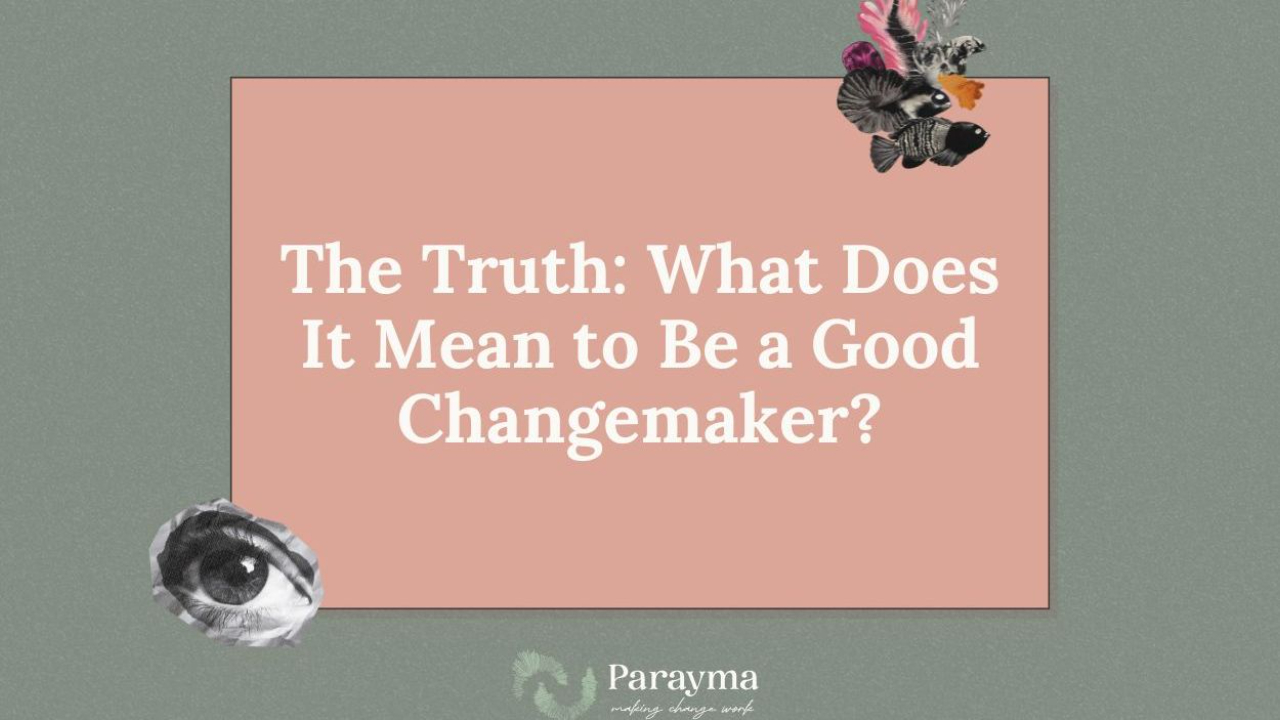The Truth: What Does It Mean to Be a Good Changemaker?
Sep 30, 2025
The word changemaker is often used casually these days - people call themselves changemakers, organizations embed “changemaker” in their mission, and social programs inspire people to become changemakers. But what does it really mean? Why does it matter? And how do you move from idea to real impact in a sustainable, authentic way?
To begin, changemaking is more than a title or a label. It’s a lived practice, a map of one’s relationship with power, responsibility, and care. It’s an orientation - not simply in what you do, but how you see yourself in the world, how you act inside systems, and how you hold your integrity as you act. In the age of climate crisis, inequality, political turbulence and global fragility, we need people who care and act - people who recognize their power and agency and use them wisely.
A changemaker is someone who sees a gap or a wound in a system, feels a sense of responsibility, and steps forward (even if imperfectly) to contribute healing, innovation, and repair.
With that in mind, let’s explore what it truly means to be a changemaker in today’s world, how you can cultivate that identity from within, the practices you’ll grow, and the challenges you’ll likely face.
Beyond a Simple Definition: Why “Changemaker” Matters Today
In many corners of social impact, the term “changemaker” risks becoming hollow branding. But when grounded, it signals a shift in power: from thinking change is for a few heroic people to seeing everyone as having agency.
However, after 16 years of “changemaking”, I strongly dislike the term “changemaker” and instead prefer “changeworker”. My challenge with it was this: do we really ‘make’ change? Do we ‘make’ things happen? It seems to suggest a level of control, ownership and personal attribution that I have rarely seen in my many years of practice.
Most often, it takes decades if not generations to truly enact social change. It’s not any one person’s responsibility or realistic expectation to be the sole person “making” change. Rather, it’s the collective momentum and power over years that actually leads to sustainable, meaningful change.
In a world confronting overlapping crises, systems are under stress. We don’t need more fragmented interventions; we need more people who think systemically about complex social or environmental causes, act relationally, and hold inner belief and hope.
A robust changework identity helps you:
- Anchor your commitment so you don’t burn out
- Navigate the tension between urgency and patience
- Sustain integrity even when pushing boundaries
- Connect and collaborate across divides
My own journey helps illustrate the stakes: as a child, we moved from the German-speaking part of Switzerland to French-speaking Geneva, where I didn’t speak the language. The experience of being surrounded by other children, and adults, with whom I could not communicate and who could not communicate with me, shaped me deeply. It gave me an embodied understanding of the fact that we all have completely different inner worlds and perspectives, and a deep wish to understand and be understood. I believe this played a role in my ability to listen, to have empathy with others, and to build bridges.
For folks early in their journey, I would recommend immersing yourself in different worlds, whether by living in a part of the world where you don’t speak the language or by reading fantasy books. Practice deep listening whenever possible, and begin to unlearn that what you have been taught is ‘normal’ is the norm. Curiosity is your greatest ally.
So as we dig deeper, keep in mind: being a changeworker isn’t just about doing; it’s about self‑redefining, re-orienting, and evolving the self.
Defining the Changeworker: Catalysts for Positive Social Impact
The Core Essence: What is a Changeworker?
At its root, a changemaker/changeworker is someone who takes creative, intentional action to improve systems, communities, or norms - not just in small, isolated ways, but with awareness of interdependence. A changeworker is a person with a bias toward action - someone who works to make the world a better place, in big or small ways.
A changeworker sees that everything they do (or don’t do) matters. You vote for the world you want to live in with your consumption, with your presence, and with your voice. You begin noticing where your actions deviate from your values, and you try to realign them gradually. For instance, how you feed yourself, how you travel, what you buy, or refuse. This is not about perfection but about continuous alignment with your deeply held values.
Changeworkers don’t wait for perfect conditions -they step in where there is a crack. They act within their sphere of influence, not pretending they can fix entire systems single-handedly, but focusing on things under their control.
Distinguishing Changemakers: Key Characteristics
Here are traits that many of your most favorite and successful changeworkers embody:
-
Care & empathy
The first movement towards action isn’t strategy, but heart: caring for people, justice, and the planet. Without care, burnout, stress, and lack of purpose become much more likely. -
Critical thinking & narrative awareness
Changeworkers question the stories they were told: that humans are separate from nature, that women exist to serve men, that growth must always be prioritized. They become curious about what beliefs they carry in order to identify which stories they’ll discard or rewrite. -
Bias toward action
Many people have ideas; few take the first step. I often say: “if you see something that bothers you, speak up. Pick your battle. The confidence to take action builds over time.” That impulse - the willingness to begin even without certainty - is a defining trait of changeworkers. -
Resilience, courage, & adaptability
You’ll weather resistance, setbacks, and doubt. A changeworker keeps going, recalibrates when faced with challenges or difficulty, and holds vulnerability while being persistent. -
Relational orientation
Changeworkers see systems change as a collective pursuit, not a solitary one. You build bridges, connections, conversation, and coalition. You operate with humility, co‑design, care, trust, and unshakeable hope. -
Integrity, accountability, & humility
You act in alignment with your values, invite critique, accept accountability, adjust course, and take responsibility for unintended harm.
We also see changemakers as visionary, patient yet persistent, questioning, leading by example, building trust, asking tough questions, and encouraging transparency.
These traits aren’t fixed and you’re not born with them - you cultivate and practice them over time. The path of a changeworker is iterative.
Changeworkers also seek community, support, and mentorship because they're excited to learn from others. Check out our FREE online workshops: Systems Change 101 and Find Your Purpose 101.
And for even deeper guidance and advice, explore our highly rated program Changework Compass designed to help you gain clarity and momentum.
The Changemaker’s Mindset: Cultivating a Vision for Transformation
Empathy as the Foundation: Understanding Social Issues & Inequalities
Empathy means more than feeling: it means deeply seeking to understand lived experience, especially of people disempowered by systems. It means listening without imposing your logic. It means holding your own assumptions gently and being open to surprise.
From my youth, being in a foreign language environment as a child taught me that people hold deeply different inner worlds. That shaped my capacity to listen and to maintain curiosity across differences. That is a foundational skill in changeworking.
In practice, empathy informs design, keeps your intention aligned, helps keep you grounded in real needs, and helps you avoid doing harm or replicating patterns of dominance.
Visionary Thinking & Problem‑Solving: Seeing Solutions Where Others See Problems
Changeworkers carry a strong vision - not a fixed blueprint, but a core sense of possibility. They notice patterns, connections, and unseen gaps. They imagine new relationships, systems, and rules. Being a changeworker sometimes means tapping into your creativity and imagination to brainstorm brand new ways of doing things.
This doesn’t mean naive optimism. Far from it: it means having a grounded vision, and combining data, systems insight, lived experience. It means holding both the present mess and the ideal future.
In your own work, you may see, for example, that reducing consumption is part of systems change. Or that shifting narratives is upstream work. That kind of sensitivity comes from having both vision and systems fluency.
Resilience & Adaptability: The Long Haul Mentality
Change doesn’t happen overnight. The systems push back. You’ll inevitably face resistance, critique, and failure. A changemaker anticipates that and plans for buffers, boundaries, and recovery.
You adapt your tactics as you learn. You fail small, reflect, and iterate. You treat obstacles not as defeat but as feedback.
This is why, here at Parayma, we talk about rhythms, regular rest, and community support - because resilience is not accidental, it has to be cultivated.
Integrity & Accountability: Guiding Principles for Impactful Decisions
Your intention and design matter, but so does how you carry yourself. Decisions must align with your ethics. You must invite critique, accountability, and repair. You must be transparent about what you know and what you don’t.
In systems change, power imbalances are everywhere. Acting with integrity means staying aware of your own privilege, your influence, and possible harm. It means co-designing with people you aim to serve, not dictating to them.
The Practice of Changemaking: Your Role in Driving Social Impact
Individual Actions: Starting Where You Are
Being a changeworker means you don’t wait for permission to begin. You start in micro‑ways. You question your own consumption, your narrative alignment, your daily habits. You try small experiments. You speak up in your circle. You walk your local neighborhood, vote with your dollars, and amplify community voices.
This is how you build your changemaking muscle. Each choice becomes a mini alignment with what you believe.
Collaboration & Collective Action: Building Movements for Change
Change at scale happens when many act together. Changeworkers rarely work in isolation. Coalitions, networks, multistakeholder tables, social movements - they’re the vessels of systemic shift. They’re how it gets done.
You build trust, share power, coordinate, and remain open to learning from others. Collective impact reminds us that durable change comes when aligned actors across sectors work with shared goals.
Join other changeworkers and check out our FREE online workshops: Systems Change 101 and Find Your Purpose 101.
And for even deeper guidance and advice, explore our highly rated program Changework Compass designed to help you gain clarity and momentum.
Embracing Social Innovation & Entrepreneurship
Sometimes changework means building new models - social enterprises, labs, experiments - as vehicles of systemic transformation. These models bridge between the divide between ideal and current practice, and demonstrating alternatives and prototyping new economies.
You don’t need to be a founder, but you may support or incubate innovations that challenge norms, embed markets, or not-for-profit hybrids that hold both feasibility and justice.
And if creativity or innovation isn’t your strong suit, being a changeworker also means supporting those who are in whatever capacity you have.
The Systemic Approach: Understanding & Influencing Policy & Frameworks
Many problems persist because of underlying rules, policies, power, norms, beliefs, and incentives. A changeworker looks upstream: how is the system structured? What laws, incentives, and narratives keep things locked in? How can you influence governance, public policy, and institutional architecture?
This means being fluent in system mapping, stakeholder analysis, advocacy, and narrative work. It means working not only in the gap but on the scaffolding of the system.
Navigating the Changemaker Journey: Challenges, Learning, & Sustaining Impact
Overcoming Obstacles: Learning from Setbacks & Facing Criticism
Every changeworker meets resistance: from systems, from stakeholders, from peers, from colleagues, and from their own doubt. Critique is inevitable. Mistakes will happen. The difference lies in whether you shrink or grow from them.
You reflect, you repair, and you pivot. You use grief and frustration as entry points for deeper insight. You don’t let perceived shame silence you, but you let it guide recalibration and trying again.
Continuous Learning & Growth: Adapting to Evolving Needs
The world shifts. What was relevant five years ago may not be now. Changemakers stay learners. They read, listen, travel, immerse themselves in other worlds, ask hard questions, and dare to step outside their comfort zone.
As a changeworker for over 16 years now, I recommend immersing yourself in different worlds - even living somewhere you don’t speak the language - to see and experience beyond your bubble. Curiosity is your greatest ally in changework.
Measuring & Communicating Impact: Proving the Value of Your Work
Systems change often unfolds slowly. How do you show progress? You develop metrics, narratives, feedback loops, and evidence of shifts - not just outputs. You tell stories aligned with systemic logic, not only numbers.
You frame success in terms of capacity built, awareness raised, relationships shifted, and leverage points moved, not only services delivered or funds raised.
When stakeholders, funders, and communities ask “so what changed?”, you translate the intangible into meaningful insight without flattening complexity.
Becoming a Changemaker: Your Path Forward
Identify Your Passion, Talents, & Sphere of Influence
Start where your heart breaks, what moves you. Map your strengths, your context (resource limitations, capacity, culture, society), and your local community. Identify where you can begin - what small sphere you can influence. That’s your launch point.
Seek Education, Mentorship, & Training Pathways
Please know: you don’t have to travel this path alone. Seek out values-aligned mentors, peer cohorts, and programs (like Parayma’s Changework Compass) that strengthen your systems literacy, resilience, peer support, and professional network. Read widely - psychology, philosophy, ecology, communication science, even fiction.
Engage Actively in Your Community & Beyond
Find collectives, join dialogues, co-design with marginalized communities, volunteer, and experiment. Build relationships and nurture the best ones over time. Offer your time, energy, and capacity. Use your voice, however small, to raise questions, connect others, and start taking small action.
In communities you live in, consider inviting others into curiosity. Over time, this grows into collective muscle and community impact. You can be the catalyst.
Embracing the “Anyone Can Be a Changemaker” Philosophy
The word “changeworker” is only powerful if it remains inclusive. You don’t need grand credentials, capital, or heroic scale to claim it. A child organizing a neighborhood cleanup is a changeworker. A teacher rewriting curriculum, a parent shifting parental norms, a neighbor raising awareness - they all count.
Because the real honest truth is: change doesn’t come only from elites or the 1%. Change can come when many people in their neighborhoods, circles, offices, and communities step forward and start working together towards a shared goal. We can all tip the system together.
Your Enduring Role in Shaping a Better Future
The Collective Power of Individual Changemaking
Each person’s action is a drop in the bucket. Drops build into waves. The world shifts not because of one hero, but because many people changed, connected, and influenced systems. A tipping point emerges when narratives shift, infrastructures move, and mindsets evolve.
A Call to Action: Embrace Your Vision & Drive for Positive Impact
Don’t wait! There’s never a better day to start than today. And it’s never too late to start. Decide what difference you want to make. Begin small. Experiment. Fail. Learn. Connect. Use your voice, your body, and your presence. As renowned scientist and conservationist Jane Goodall said:
“What you do makes a difference, and you have to decide what kind of difference you want to make.”
You already carry power. Your choices, your questions, and your curiosity matter. Stand in your responsibility, but also in your humility. You are not alone, I promise.
The Tipping Point: Shaping the 21st Century With Purpose
Just like many who have come before us, we live in a time when systems are under stress, but also under possibility. The cracks are openings. The grief you’re feeling is a door. The next paradigm awaits. We need people who can hold complexity, bridge differences, hold hope and stay persistent. This is everything it means to be a changemaker/changeworker today.
To learn more, check out our FREE online workshops: Systems Change 101 and Find Your Purpose 101.
Or for even deeper changemaking guidance and advice, explore our highly rated program Changework Compass designed to help you gain clarity and momentum.
Applications now open
The Harvest Lab
8-week guided journey for changeworkers, thought leaders, educators, and visionaries ready to shape their lived experience into aligned offerings — and to do it in a way that feels regenerative, not depleting.
Subscribe to The Changework Journal
Get first access to new offers, free or discounted tickets to events Nora speaks at, exclusive access to funding opportunities we source from our network (not shared anywhere else on our channels), and more!



